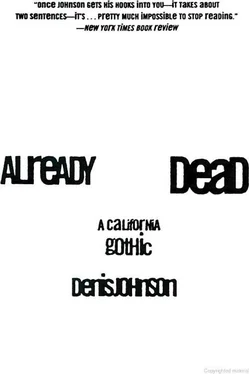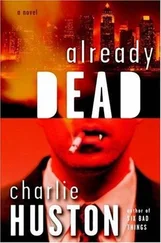in his hand and slung it toward the opposite bank, a distance of four or five feet. Down nearer the water’s level it seemed much wider, a placid river whose other side was lost to his eyes. But it was swift, and getting deeper. Wading and floating, he lost the bottom and the rushing water cartwheeled him — pebbles, bubbles, pebbles, bubbles—
He was looking up at leaves again…The forked alder leaned down close above him. His rucksack lay beside his head.
He entered a tentative communion with the person watching all this, through which he formed a vague understanding that the person watching had been unconscious, and that he was the person. One of them jerked upright now like a marionette, and the other sent him downhill, dangling near the edge where the gully plunged deep and he felt himself also plunging. By refusing to think about the gully he began to lessen its pull. He began to go another direction simply by thinking about it. Water clucked in his shoes with every step. Rain fell heavily. He heard the gusts and the cannonading surf. This thing had to be dealt with, this thing that had happened.
Each time he looked up he saw the pig-men in the distance — in the lightning, in the rainbows, in the sunset, in the dark woods — always silhouetted, like some sort of monument to nothing. To themselves.
Again he found himself among trees, and he rested, leaning downhill, astride the trunk of a eucalyptus. Reached up with his functioning arm and grappled down a lot of long dry leaves. Plucked like a flower, hauled into the sky, the tree began to slip upward away from him. He went down on his side, waited for strength, crawled on two knees and one forearm toward a small slow-running wash. Lay with his face in the water and sucked at it. Turned his head sideways in three inches of clear water that drifted in and out of his open mouth. His right hand crawled up toward his ear and dislodged a length of shale from beneath his cheek. Lying there with half his head in the little flow he scraped away the pebbles before his eyes and pried with the shale in the layer of clay beneath them. He pushed to a sitting position and let himself backward against a rock and once again rested, watching the misty crimson tresses lengthen from his pants leg down the rivulet, over a six-foot drop and out of sight.
The nasty pimpled alder stood above him. Beside the water lay his rucksack. He began to understand that he’d accomplished these 412 / Denis Johnson
innumerable journeys, so many and so involved he could hardly remember them, in a radius of three or four feet.
A path, too wide to have been delved by animals, a path for human traffic, passed along among the trees quite near to where he sat against this small boulder with his lap full of mulch and muck. Sleep pushed itself against him, gigantic and soft, but he was certain if he drifted sideways and lay along the ground he’d never get up.
Like a one-handed baker at his bread he rigged two poultices of clay and wrapped them in long eucalyptus leaves and paused a while, looking around him at things he didn’t quite recognize.
The roving dilated apertures of him zoomed down to pinpoints. He was looking at a broken stump.
A buzzard alighted, slowing its descent by clapping its wings together before its chest, and then stood there on the stump with its wings outspread and uplifted gingerly to dry — drops pending from its pale liver-ish under-feathers and the light behind it streaked with its silhouette — a raindrop on the tip of every feather. Everything else was wet too.
Smooth nuggets plummeted from the forest’s upper stories.
“Hey man.”
Did I say that or did you?
“You are the Thunderbird.” That’s me. I’m the one speaking.
By kicking at it he loosened a stone from its nook, a flat rock the cir-cumference of his head, four inches thick. Moving along on his knees, he pushed it into the middle of the path. He set the poultice beside it.
He lay himself on his side and stretched his right arm out to drag toward him his second cake of clay and eucalyptus.
He positioned his materials, the poultices, the flat stone, next to a knee of rock about the span of his hand cropping up beside the path.
Slapped a poultice across his back, across his shattered left shoulderblade, and lay back with the poultice between the rock and the wound and screamed, putting the pressure of his weight against this point. The buzzard’s dark shape crossed his face. He breathed hard and fast for a minute, then gradually slower. With his right hand he pushed apart the lapels of his white robe, reached for the second poultice and placed it over the entrance wound, and wrestled up onto it the flat rock. His outcries gave over again to rapid breathing, which didn’t slow, but instead accelerated until his features relaxed and he lost consciousness.
Already Dead / 413
Though he woke with a storm and red fog in his head, certain thoughts came clearly. The bleeding had abated, or he’d never have wakened. The Thunderbird had crossed him with good luck. His rem-edies had saved him, and he had to move. He did so instantly, sitting up, pushing his good hand against the ground, and by the device of placing his feet downhill from him on the steep ground, managed to get them under himself and managed to stand. He clung to a trunk and rested, then began to let himself down the hillside from tree to tree. In such dampness the fitful light can’t be heat lightning. And not some synaptic arc-welding as his consciousness burned up inside his head, because its silent bursts complicated the foliage with shadows.
Where the gully’s sides had collapsed and the trees had fallen over, a hole opened in the prospect all the way to the horizon of the sea. Out there a pall of cloud rose precariously from the flecked water, branched with brief emanations and flickering inside as if it had swallowed TNT.
A thing without a face, maybe without a head, it executed a lewd tyr-annosauric hootchycoo and it thundered. Wrenching, pitiable. Behind it a second bank of clouds luffed and darkened, then a storm gathered down onto and devoured it. Here the leaves dripped quietly, hardly moving, but out at sea the sunset had been erased from the blackboard, replaced by a gorged darkness. All of this sent a wave of violent air over the water and against the land with the force of a detonated bomb.
Had he touched something, set something off in his face? — his robe puffing up like a balloon, his hair nearly dragged from its follicles with a pain that made him angry, the trees flattened, stripped like bones in a boil, leaves blowing at and over him. Lightning, a hag’s hand ripping out, pointed at his destination down there. An interval of brown retinal shock, and everything drowned in thunder. More flashes denominated certain milliseconds: uphill from him, a man here. A man there. Turned toward each other in poignant stopped confusion. Then again — floundering up the hillside. Fairchild floated, the balls of his feet touching earth once, twice, down the hill and again under branches.
The ground leveled. The forest fell away. The storm was over, the cloud bank wadded along the horizon and the episode already forgotten, the whole ocean fallen flat, conked out like a baby animal. The sky overhead appeared a vacuum, without weather or stars, and he came down through moist ground-clinging perfumes into the uniformity of twilight.
414 / Denis Johnson
The creek fanned open, two inches of water slid over flat sand through a dale that must have been cleared by settlers. An untended orchard.
A rusty hayrick, some isolated fenceposts teetering like ashes. Uplifted, freshened by the changes in atmosphere, breathable changes, he kept on alongside what must once have been a road, not down to the sea, but up out of the sea, a little quarter-mile track letting cargo from the ships to the logging town that wasn’t here anymore, past the cabins and the schoolhouse that had gone and around and through the orchard that hadn’t. The apple trees were ancient, unpruned and extravagantly branched, the later growth curling around like tusks. You can see where one year the apples grew so fat they cracked the boughs. Most of the fruit had been nipped by deer and elk. In the highest branches a few green knuckly fortunate ones. He passed the crumbled vestiges of a wagon, its hubs and axles outflung as if to keep from going under.
Читать дальше












